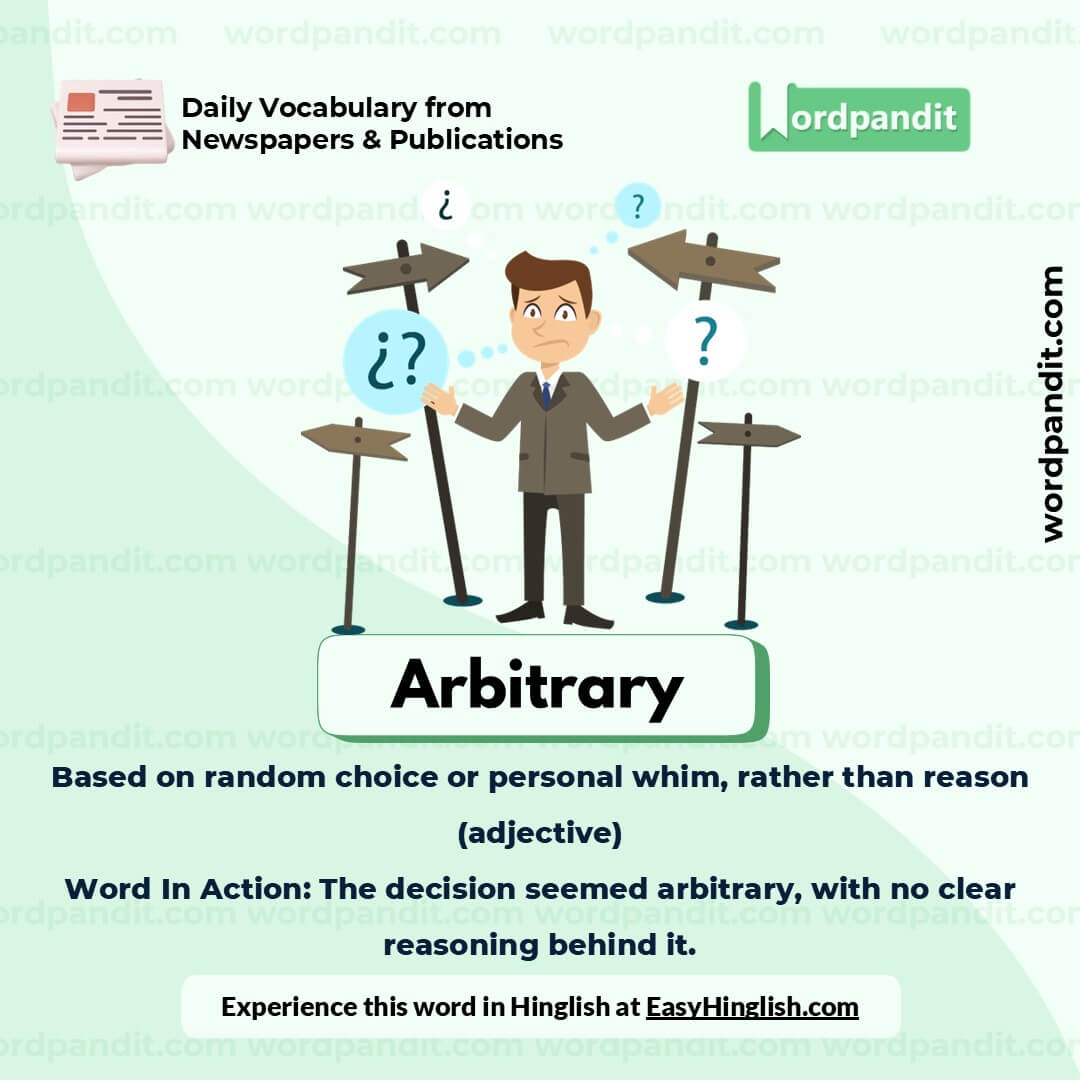Daily Vocabulary from Indian Newspapers and Publications
Welcome to Wordpandit’s Indian Vocabulary Hub
At Wordpandit, we understand the importance of staying rooted in the local context while expanding your language skills. This section focuses on enriching your vocabulary with words and phrases drawn from India’s leading newspapers and publications, ensuring you're learning vocabulary that is practical, relevant, and uniquely Indian.
Why Indian Sources Matter
We believe that the best way to master any language is by immersing yourself in local content. That’s why we carefully curate vocabulary from top Indian publications, including:
- The Hindu
- The Times of India
- The Economic Times
- Hindustan Times
- Live Mint
- The Indian Express
- And many others...
Stay Updated, Stay Relevant
With daily updates from Indian news sources, you’ll be consistently learning words that reflect the trends and shifts in Indian society and culture. Our focus is to provide vocabulary that enhances your understanding of the language in an Indian context.
How Wordpandit Supports Your Goals
Whether you’re preparing for exams, aiming to improve your professional communication, or simply want to stay connected with the latest Indian vocabulary, Wordpandit is here to guide you every step of the way.
Learn with a Practical Approach
Our interactive learning methodology includes real-world examples, engaging activities, and context-specific usage to ensure that every word becomes part of your active vocabulary.
Dive into Indian Vocabulary Today!
Why Choose Wordpandit?
Practical Learning: Focus on words you'll actually encounter in real-world reading, enhancing your comprehension and communication skills.
Diverse Content: From current affairs to scientific breakthroughs, our varied sources expose you to vocabulary across multiple domains.
Effortless Integration: Make Wordpandit a part of your daily routine. Just a few minutes each day can significantly boost your lexicon over time.
Your Path to Vocabulary Mastery
- Visit our Daily Vocabulary section regularly
- Explore new words and their usage in context
- Practice incorporating these words into your own writing and speech
- Track your progress as your vocabulary expands
Start Your Journey Today
Embark on your vocabulary enhancement journey with Wordpandit. By consistently engaging with our daily posts, you'll build a robust vocabulary that serves you well in academic, professional, and personal contexts.
Remember, a word a day keeps linguistic limitations at bay. Make Wordpandit your daily companion in the quest for vocabulary excellence!
WORD-1: Quell
Context:
"The State government responded by forming a ‘workmen committee’ to resolve the problem and resorted to police violence to quell the workers’ strike which began on September 9." - The Hindu
Explanatory Paragraph:
Quell means to suppress or put an end to something, especially by using force or authority. When a government, army, or force 'quells' a disturbance, they bring it under control by using strong measures.
Meaning: To suppress or put an end to something, often by force (verb)
Pronunciation: kwel
Difficulty Level: ⭐⭐⭐ (Intermediate)
Etymology: From Old English cwellan meaning "to kill, destroy."
Synonyms & Antonyms:
Synonyms: suppress, subdue, put down, extinguish, stifle
Antonyms: incite, provoke, encourage, agitate, inflame
Usage Examples:
- The police were called to quell the unrest in the streets.
- The dictator used military force to quell the rebellion.
- She took a deep breath to quell her rising panic.
- The government's quick response helped quell public anxiety during the crisis.
Cultural Reference:
"Even the smallest spark can ignite a revolution, but the iron fist will always try to quell it." - Historical reflections on social movements
Think About It:
Do you think using force to quell a protest can ever lead to lasting peace, or does it only cause more resistance?
Quick Activity:
Write a short story about a group of people trying to quell a natural disaster in their community. What methods do they use, and how successful are they?
Memory Tip:
Think of "quell" as "quieting" a disturbance, using force to silence or suppress it.
Real-World Application:
The word "quell" is often used in political or social contexts to describe how governments or authorities manage uprisings, protests, or disturbances.
WORD-2: Arbitrary
Context:
"The restrictions must be based on logic and not arbitrary." - The Hindu
Explanatory Paragraph:
Arbitrary describes something that is based on random choice or personal whim, rather than on reason or a system. If a decision or rule is arbitrary, it may seem unfair because it lacks a logical foundation.
Meaning: Based on random choice or personal whim, rather than reason (adjective)
Pronunciation: AHR-bi-trer-ee
Difficulty Level: ⭐⭐⭐ (Intermediate)
Etymology: From Latin arbitrarius meaning "depending on the will, uncertain."
Synonyms & Antonyms:
Synonyms: capricious, random, subjective, whimsical, unpredictable
Antonyms: rational, logical, reasoned, systematic, consistent
Usage Examples:
- The decision to cancel the event seemed completely arbitrary, with no explanation provided.
- Employees were frustrated by the manager’s arbitrary rules that changed every week.
- Choosing a restaurant based on arbitrary criteria like color or name doesn’t always guarantee a good meal.
- The arbitrary selection of jury members raised concerns about the fairness of the trial.
Cultural Reference:
"The law, in its majestic equality, forbids the rich as well as the poor to sleep under bridges, beg in the streets, and steal bread." - Anatole France, a critique of arbitrary laws
Think About It:
When have you encountered an arbitrary decision, and how did it make you feel about the fairness of the situation?
Quick Activity:
Think of an arbitrary rule you have encountered. How would you improve it to make it more logical or fair?
Memory Tip:
Remember "arbitrary" by thinking of an "arbitrary choice"—one made without any reason or system, like flipping a coin.
Real-World Application:
The word "arbitrary" is often used in legal, political, or workplace contexts to criticize decisions or rules that lack a logical or justifiable basis.
WORD-3: Tenets
Context:
"Rather than following the tenets of the 1926 law to register the trade union." - The Hindu
Explanatory Paragraph:
Tenets are principles or beliefs that are considered to be fundamentally true by a group, organization, or system. They form the core rules or ideas that guide behavior or decision-making within a particular ideology, religion, or philosophy.
Meaning: Principles or beliefs, especially ones held by a group or organization (noun)
Pronunciation: TEN-its
Difficulty Level: ⭐⭐⭐ (Intermediate)
Etymology: From Latin tenet meaning "he holds."
Synonyms & Antonyms:
Synonyms: doctrine, principle, belief, creed, dogma
Antonyms: disbelief, doubt, skepticism
Usage Examples:
- The key tenets of democracy include freedom of speech and equal rights for all citizens.
- One of the core tenets of Buddhism is the idea of non-attachment.
- The school was founded on the tenets of equality and social justice.
- Environmental conservation is one of the tenets of their political platform.
Cultural Reference:
"The tenets of every major religion teach compassion, kindness, and the value of helping others." - Commentary on religious practices
Think About It:
What are the key tenets that guide your personal values or the organizations you belong to?
Quick Activity:
Choose an organization you are familiar with and list three tenets that shape its philosophy or mission. How do these tenets influence its decisions?
Memory Tip:
Remember "tenets" by associating it with "tenets" of truth—guiding principles that hold up beliefs.
Real-World Application:
The word "tenets" is commonly used when discussing the core principles of philosophies, religions, legal systems, or organizations.
WORD-4: Succinctly
Context:
"The Madras High Court... succinctly defined the history and object of the Trade Unions Act." - The Hindu
Explanatory Paragraph:
Succinctly means expressing something in a clear and concise manner, using as few words as necessary. It describes communication that is to the point without unnecessary details.
Meaning: In a brief and clearly expressed manner (adverb)
Pronunciation: suhk-SINGKT-lee
Difficulty Level: ⭐⭐⭐ (Intermediate)
Etymology: From Latin succinctus meaning "prepared, concise."
Synonyms & Antonyms:
Synonyms: concisely, briefly, tersely, compactly
Antonyms: wordily, verbosely, elaborately, diffusely
Usage Examples:
- He succinctly summarized the meeting in just a few sentences.
- The teacher asked students to succinctly explain their answers without unnecessary details.
- The report was succinctly written, making it easy to understand the key points.
- In her speech, she succinctly addressed the main issues without straying off topic.
Cultural Reference:
"Brevity is the soul of wit." - William Shakespeare, *Hamlet* (reflecting the value of succinct expression)
Think About It:
Why is it important to communicate succinctly in professional and legal contexts? Can being too brief ever cause misunderstandings?
Quick Activity:
Pick a complex topic you're familiar with and try to explain it succinctly in two or three sentences.
Memory Tip:
Think of "succinctly" as "successfully sinking" a lot of meaning into few words.
Real-World Application:
In many fields such as law, journalism, and business, being able to explain ideas succinctly is crucial for effective communication and decision-making.
WORD-5: Infringed
Context:
"A registered trade mark is infringed if it is used as the name or the part of a trade name." - The Hindu
Explanatory Paragraph:
Infringed refers to the act of violating or breaching a law, right, or regulation. When a trade mark is infringed, it means that someone has unlawfully used it without permission, leading to potential legal consequences.
Meaning: To actively break the terms of a law, agreement, or right (verb)
Pronunciation: in-FRINJD
Difficulty Level: ⭐⭐⭐ (Intermediate)
Etymology: From Latin infringere meaning "to break, violate."
Synonyms & Antonyms:
Synonyms: violate, breach, contravene, transgress
Antonyms: comply, uphold, follow, respect
Usage Examples:
- The company was sued because they infringed on another business's patent.
- Any unauthorized reproduction of this material will be considered an infringement of copyright law.
- The government has been accused of infringing on citizens' privacy rights through surveillance.
- The court ruled that the new product design infringed on existing intellectual property rights.
Cultural Reference:
"Your right to swing your fist ends where my nose begins." - A common saying reflecting the idea that one's freedom is limited when it infringes on the rights of others.
Think About It:
Why is it important to protect intellectual property from being infringed? How does infringement affect businesses and innovation?
Quick Activity:
Think of a scenario where someone’s rights might be infringed, and describe how they might seek legal protection.
Memory Tip:
Remember "infringed" by thinking of someone "intruding" on another's rights or property without permission.
Real-World Application:
Infringement is a major issue in legal areas such as intellectual property law, where trademarks, patents, and copyrights need to be protected from unauthorized use.
















